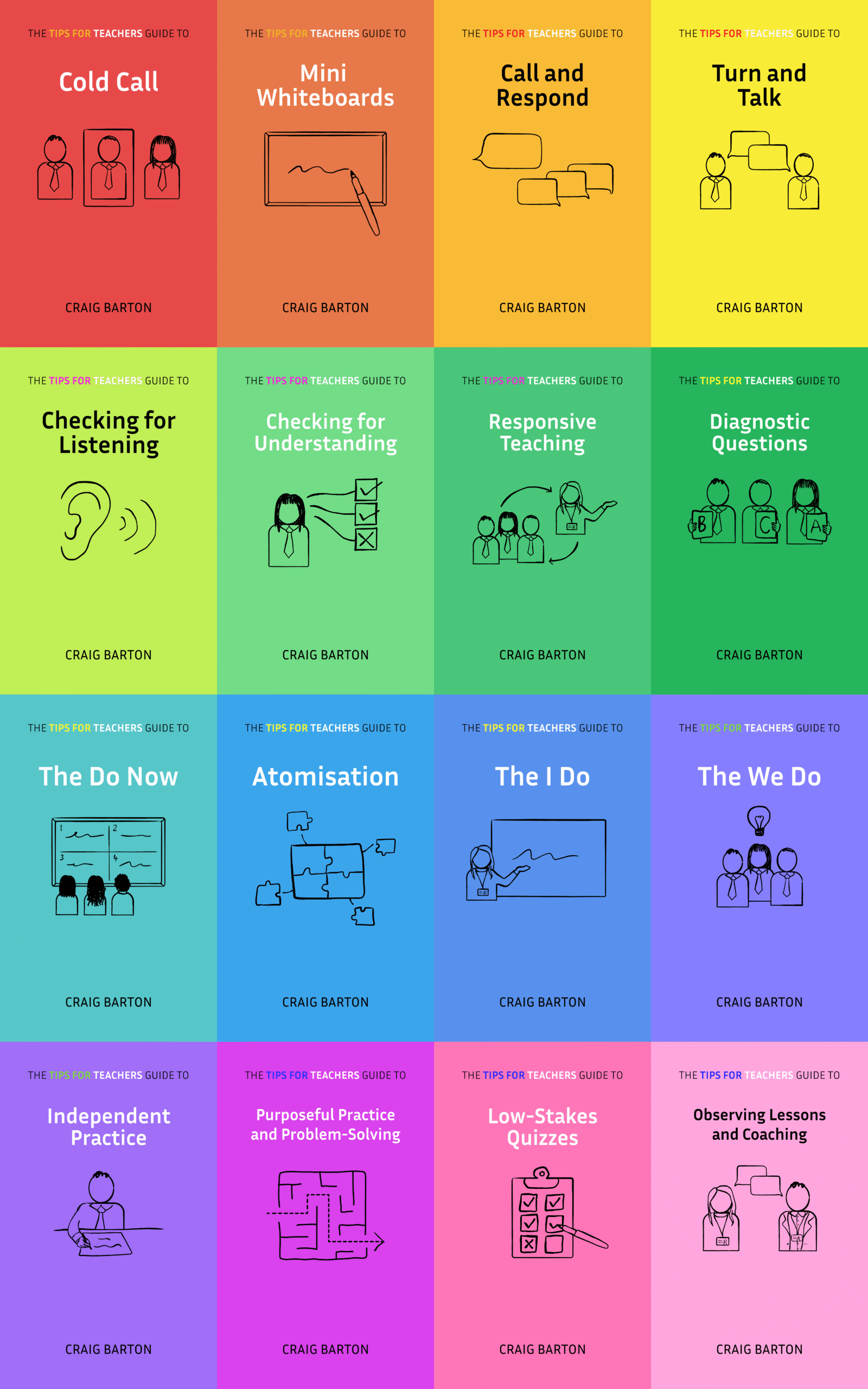
In this new series of 90-minute on-demand workshops, I distil the lessons I have learned from watching 1000s of lessons, together with insights from research and world-leading experts, into practical strategies that you can use the next time you step into a classroom to improve your students’ learning.
Each workshop is priced at £99 (+VAT).
Unlike my other online courses, these workshops are designed for teachers to work through together. Once you purchase a workshop in this series, you can share the full workshop, or clips, with all staff at a CPD session or a departmental meeting at no extra cost, as many times as you like, for a year. Thus, they are a cost-effective way of delivering high-quality, collaborative CPD.
- Free workshop: 25 Tips for Teachers
- 1. Supporting teacher change: How I observe a lesson and give feedback
- 2. Supporting student change: Embedding habits and routines
- 3. Cold Call
- 4. Mini-whiteboards: Developing routines
- 5. Mini-whiteboards: Checking for understanding
- 6. Turn and Talk
- 7. Call and Respond
- 8. Checking for listening
- 9. Checking for understanding
- 10. A model for responsive teaching
- 11. Diagnostic questions
- 12. Learner-generated examples
- 13. Planning a Learning Episode
- 14. Do Now
- 15. Atomisation – Part 1: The basics
- 16. Atomisation – Part 2: Teaching different types of Atoms
- 17. I Do
- 18. We Do
- 19. Maximising the participation ratio during independent practice
- 20. Purposeful Practice
- 21. Problem-solving
- 22. Desirable difficulties and four key retrieval opportunities
- 23. Low-Stakes Quiz
- 24. Homework
- 25. Whole-class feedback
Free workshop: 25 Tips for Teachers

Overview: I have shared one tip from each of my 90-minute CPD courses so you can get a flavour of the content and structure. Feel free to share this full workshops, or clips, with any colleagues in your school. I really hope you find it useful CPD!
Relevance: Some of these ideas are maths specific, but most transfer to any subject domain. So, hopefully something for everyone!
You can get free access to the workshop here.
1. Supporting teacher change: How I observe a lesson and give feedback

Overview: I have coached teachers for twenty years, but only avoided being rubbish in the last three. We dive deep into my coaching process. I share my specially designed lesson observation template, illustrating each section with examples from the teachers I have coached. We then look at how the evidence we collected during the lesson observation informs the structured coaching session that follows, supporting the teacher to develop new habits and routines.
Relevance: This workshop is suitable for teachers from any subject or phase involved in lesson observations, feedback, or coaching, or aspire to be so. It is also suitable for any school leaders looking to introduce or develop coaching programmes in their schools.
Access the workshop here.
2. Supporting student change: Embedding habits and routines

Overview: We may want to change what we do in the classroom, but we will be fighting a losing battle without our students on board. We examine a framework for helping students build positive, sustainable habits and routines in our classrooms. The framework is grounded in research, and each stage is illustrated by concrete examples from teachers and students I have worked with over the last ten years.
Relevance: This workshop is suitable for classroom teachers from any subject or phase.
Access the workshop here.
3. Cold Call

Overview: Cold Call is one of the most common ways of asking students questions in the classroom. But, as we shall see, it is not quite as simple as choosing a child and asking them a question. We look at tips and strategies to ensure Cold Calling maximises the number of students actively thinking hard in our classroom while also increasing the reliability of our checks for understanding.
Relevance: This workshop is relevant for classroom teachers from any subject or phase.
Access the workshop here.
4. Mini-whiteboards: Developing routines

Overview: Mini-whiteboards are my favourite way of checking students’ understanding. But to fully reap the benefits of using mini-whiteboards, we must first reduce the costs associated with them: faff, time, and potential behaviour issues. This workshop examines practical strategies to make our mini-whiteboard routines slick and effective.
Relevance: All my mini-whiteboard examples are from the secondary maths classroom. I am confident the strategies transfer to upper primary, but I cannot promise they also transfer to other subjects.
Access the workshop here.
5. Mini-whiteboards: Checking for understanding

Overview: Once we have reduced the costs associated with using mini-whiteboards, our next job is to ensure we maximise our ability to collect valuable data from our students to increase the reliability of our checks for understanding. In this workshop, we look at innovative, practical strategies to do exactly that.
Relevance: All my mini-whiteboard examples are from the secondary maths classroom. I am confident the strategies transfer to upper primary, but I cannot promise they also transfer to other subjects.
Access the workshop here.
6. Turn and Talk

Overview: Asking students to discuss something with their apartment seems straightforward enough. But with students, things rarely are. We examine how to maximise the effectiveness of paired discussions in our lessons. When should we use them, how do we ensure both parties have their say, and what should we do following a Turn and Talk? All will be revealed!
Relevance: This workshop is relevant for classroom teachers from any subject or phase.
Access the workshop here.
7. Call and Respond

Overview: Call and Respond may seem like a weird way to ask students to participate: the teacher says one half of a statement, and then all students respond in unison. In this workshop, I will share several use cases for Call and Respond, as well as practical tips and strategies to maximise the chance of it being effective.
Relevance: This workshop is relevant for classroom teachers from any subject or phase.
Access the workshop here.
8. Checking for listening

Overview: If students are not listening, they will not understand. It’s as simple as that. Unfortunately, many students do not listen to our instructions, explanations, or their classmates. We examine why and what practical steps we can take to improve our students’ attention.
Relevance: This workshop is relevant for classroom teachers from any subject or phase.
Access the workshop here.
9. Checking for understanding

Overview: A teacher not checking for understanding is like a painter painting with their eyes closed. However, not all checks for understanding are created equally. In this workshop, we examine some guiding principles – and associated strategies – to ensure our checks for understanding are as effective and reliable as possible.
Relevance: Although all of the examples are from the world of secondary maths, I am confident this workshop is suitable for classroom teachers from any subject or phase.
Access the workshop here.
10. A model for responsive teaching

Overview: Checking for understanding is only one-half of the story. Once we have the in-class data from our students, what do we do with it? In this workshop, we examine my model for responsive teaching, focusing on high-value teacher actions in three common scenarios: most students get it, some students get it, and very few students get it.
Relevance: All the examples I use are from the world of maths. I am confident the strategies transfer to upper primary. I have delivered this CPD many times whole-school, but teachers of other subjects will need to think hard about how to adapt the strategies.
Access the workshop here.
11. Diagnostic questions

Overview: Multiple-choice diagnostic questions are among my favourite tools for checking student understanding. In this workshop, we will examine strategies for gathering accurate data from our students, responding accordingly, and innovative ways of using the questions beyond simply challenging students to find the correct answer.
Relevance: Although I use questions from secondary maths, I am confident the strategies transfer to other phases and subject areas.
Access the workshop here.
12. Learner-generated examples

Overview: Challenging learners to create multiple examples amidst certain constraints can reveal unique insights into the depth of their understanding and facilitate positive classroom discussions. In this workshop, we look at models to help learners generate their own examples for any mathematical concept.
Relevance: This workshop is relevant for maths teachers from Key Stage 1 to Key Stage 5.
Access the workshop here.
13. Planning a Learning Episode

Overview: A mistake I made for many years was thinking the correct unit of time for planning was the lesson. Now, I plan in terms of Learning Episodes. In this workshop, we consider three possible structures to a Learning Episode, the purpose of each element with the structures, and what this looks like when we sit down to plan our lessons.
Relevance: This workshop is relevant for maths teachers from Key Stages 2 upwards. The content may transfer to Key Stage 1, but I cannot promise.
Access the workshop here.
14. Do Now

Overview: How we start our lessons sets the tone for what follows. In this workshop, we dive deep into the Do Now phase of a lesson, thinknig hard about the structure, content, difficulty, and how we can ensure we get an accurate sense of our students’ levels of effort and understanding.
Relevance: This workshop is relevant for maths teachers from Key Stages 2 upwards. The content may transfer to Key Stage 1, but I cannot promise.
Access the workshop here.
15. Atomisation – Part 1: The basics

Overview: How we break down a concept is a key factor in determining if our students will understand it. In this workshop, we look at how to choose the best examples to teach a new concept, how to break that example down into Atoms, and how to deal with those Atoms students have met before. This gets you 80% of the benefits of Atomisation.
Relevance: This workshop is relevant for maths teachers from Key Stages 2 upwards. The content may transfer to Key Stage 1, but I cannot promise.
Access the workshop here.
16. Atomisation – Part 2: Teaching different types of Atoms

Overview: Having chosen a good example, broken it down into Atoms, and assessed the Atoms students have encountered before, we can now teach the new Atoms to students. In this workshop, we examine how to label each new Atom and how that labelling will determine the most effective way to teach it. This helps us reap the final 20% of benefits from Atomisation.
Relevance: This workshop is relevant for maths teachers from Key Stages 1 upwards. You will need to have taken Atomisation – Part 1 first.
Access the workshop here.
17. I Do

Overview: Over the 20 years I have taught, how I model new ideas to students has changed dramatically. In this workshop, we examine how to deliver a clear, concise, teacher-led I Do and how to maximise the chance of our students following our explanation.
Relevance: This workshop is relevant for maths teachers from Key Stages 2 upwards. The content may transfer to Key Stage 1, but I cannot promise.
Access the workshop here.
18. We Do

Overview: Following our I Do, we need reliable evidence that our explanation has made sense. That is where the We Do comes in. In this workshop, we look at strategies to ensure the We Do delivers an effective check for understanding that involves every pupil and provides an effective bridge between the I Do and the independent practice that follows.
Relevance: This workshop is relevant for maths teachers from Key Stages 2 upwards. The content may transfer to Key Stage 1, but I cannot promise.
Access the workshop here.
19. Maximising the participation ratio during independent practice

Overview: Often, students will choose to take a cognitive break the moment they are asked to do some independent practice. In this workshop, we will discuss a range of strategies to prevent this from happening, thus enabling your students to keep thinking hard throughout the lesson.
Relevance: Apart from a few maths-specific parts, the bulk of this workshop is relevant for classroom teachers from any subject or phase.
Access the workshop here.
20. Purposeful Practice

Overview: Purposeful Practice describes a special type of activity that can help bridge the gap between Consolidation and Problem-Solving. In this workshop, we look at three activity structures that can provide such Purposeful Practice to all our students and discuss strategies for getting the most out of them.
Relevance: This workshop is relevant for maths teachers from Key Stages 2 upwards. The content may transfer to Key Stage 1, but I cannot promise.
Access the workshop here.
21. Problem-solving

Overview: Problem-solving is the holy grail of maths teaching and learning. We all want our students to become capable, confident problem-solvers, but how do we do it? In this workshop, we look at three problem-solving structures and their associated strategies, to help ALL students method-select, cope with worded problems, and develop a set of problem-solving tactics.
Relevance: This workshop is relevant for maths teachers from Key Stages 2 upwards. The content may transfer to Key Stage 1, but I cannot promise.
Access the workshop here.
22. Desirable difficulties and four key retrieval opportunities

Overview: The Bjorks and their contemporaries’ work on memory has fundamentally changed how I plan and teach. In this workshop, we will discuss four key retrieval opportunities teachers have available, and examine the research into desirable difficulties to maximise the effectiveness of those retrieval opportunities. This is our best chance to prevent our students from forgetting what they once knew.
Relevance: All the examples I use in this workshop are from secondary maths classrooms. However, retrieval principles and desirable difficulties transfer across subjects and phases. So, I am confident that primary colleagues and teachers of other subjects will find this workshop valuable—they will just need to work a little harder to adapt the ideas to their domains.
Access the workshop here.
23. Low-Stakes Quiz

Overview: A weekly Low-Stakes Quiz can be one of the most powerful ways to give students a regular retrieval opportunity. Those schools I have supported in introducing Low-Stakes Quizzes have seen a significant improvement in retention and student motivation. In this workshop, we examine the features of an effective Low-Stakes Quiz, including its content, format, marking, and how students use their corrections in the future.
Relevance: The Low-Stakes Quizzes shared in the workshop are all from secondary maths classrooms. I am confident that the principles apply to upper primary students. I am also confident that the frameworks and strategies could be applied to other subjects, but colleagues would be responsible for thinking of the adaptations required.
Access the workshop here.
24. Homework

Overview: Homework has a unique advantage: it does not take up precious lesson time. However, homework’s potential positive impact on student learning is often tempered by poorly designed homework, or not enough students doing the homeworks. So, what does research tell us about impactful homework design and how to get as many students to complete homework as possible?
Relevance: Although my examples are from secondary maths, the principles of effective homework design and boosting student participation rate should apply to other subjects and upper primary.
Access the workshop here.
25. Whole-class feedback

Overview: Workload is one of the drivers of teachers leaving the profession, and the requirement to give individualised written feedback on homework and assessments is a key contributor to workload. What does the research say about written feedback, and how can we shift to a model of effective whole-class feedback?
Relevance: This workshop uses examples from secondary maths. The principles of effective whole class feedback apply across different subjects; however, colleagues would be responsible for thinking of the adaptations required.
Access the workshop here.








